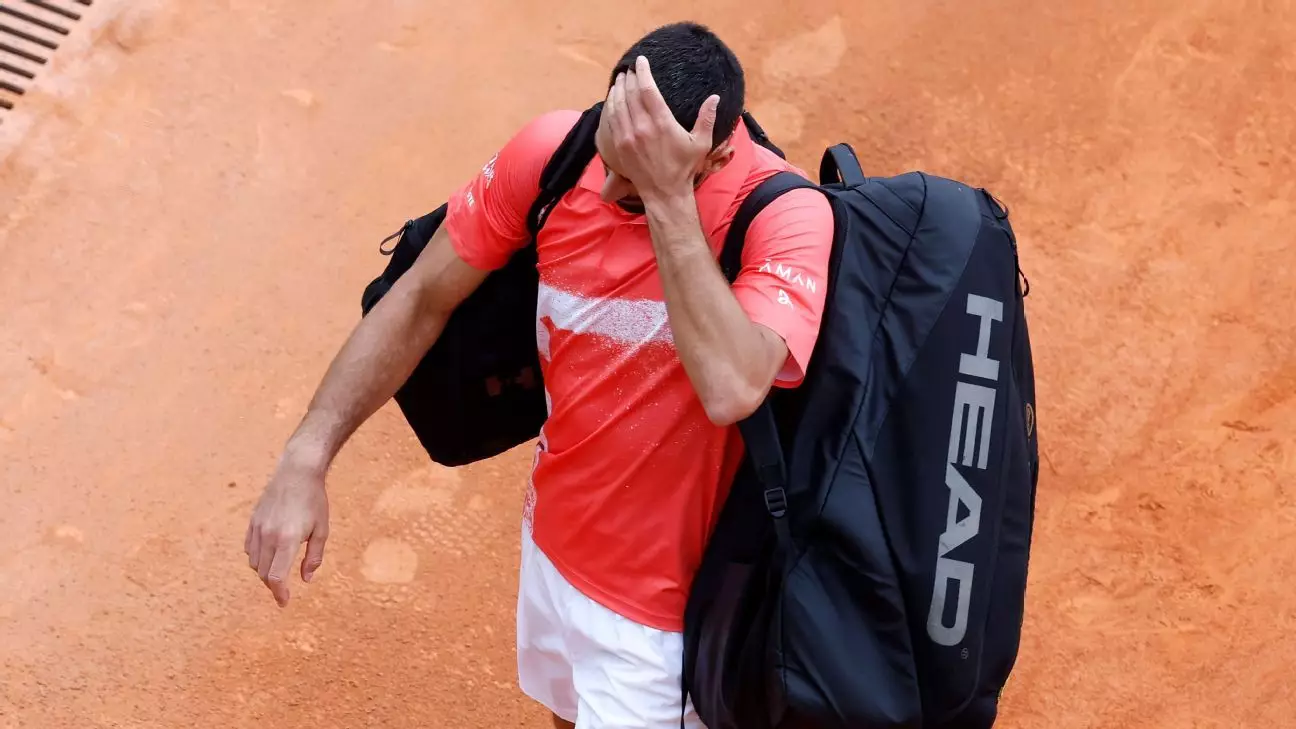In an electrifying episode of the Monte Carlo Masters, Alejandro Tabilo emerged from the shadows to deliver a stunning blow to tennis titan Novak Djokovic, a match that would reverberate through the ATP circuit. This encounter was marked not merely by Tabilo’s growing prowess but also by Djokovic’s unexpected lapses, culminating in a 6-3, 6-4 victory for the underdog. Tabilo’s performance was a testament to resilience and mental fortitude, shedding light on the complexity of competitive sports where psychological factors often wield tremendous power.
Hailing from Chile, Tabilo’s victory over Djokovic was reminiscent of their previous clash at the Italian Open, where he played with poise and confidence. His ability to hold his nerve in such high-stakes moments reveals an athlete maturing under pressure. In his post-match interview, Tabilo candidly expressed his nerves but emphasized the critical elements of his game that he sought to replicate from their last encounter. This blend of memory and practice propelled him forward on this day.
The Weight of Expectations on Djokovic
For Djokovic, this match represented more than just a shot at another title; it was an opportunity to reaffirm his dominance in the sport as he aimed for his 100th career title. However, as the match unfolded, the weight of his expectations seemed to compound the difficulties he faced. With 29 unforced errors to his name, the game was a stark reminder that even champions can falter when under duress.
Djokovic’s reflections post-match revealed a rare vulnerability; he expressed disappointment not just in the match’s outcome, but in his overall performance. His admission of lower expectations contrasted sharply with the weight of his past achievements, revealing the dichotomy faced by elite athletes. As he approached 38, with a record burden of victories behind him, it became increasingly clear that the mental aspect of tennis could be just as challenging as the physical demands of the sport.
The Clash of Generations
This particular match also highlights a broader theme in tennis: the battle between the game’s established stars and its ambitious newcomers. Tabilo’s victory over Djokovic reminds us that in sports, the script is often rewritten. His performance in Monte Carlo positioned him alongside notable players like Marat Safin and Jiri Vesely, who have also experienced success against Djokovic. This evolving landscape in men’s tennis signals a shift, where talented younger players are no longer content to be mere challengers; they are emerging as legitimate threats to established champions.
Conversely, the implications of Djokovic’s defeat extend beyond Tabilo alone. His loss opens doors for other players in the field, allowing the likes of Carlos Alcaraz and Lorenzo Musetti to rise in prominence. As the night’s matches continued, Alcaraz kicked off his clay-court season with a robust performance, overcoming an initial setback to secure a victory over Francisco Cerundolo. It’s a telling contrast—Tabilo used his experience to mount a comeback, while Djokovic, who often seems impervious, could not harness his usual form.
Pivotal Moments in Monte Carlo
Mont Carlo is no ordinary tournament; it is a symbol of a progressing tennis season where players seek to hone their craft on clay before the prestigious Roland Garros championship. It is inherently a platform where matches possess the potential to alter the trajectories of careers. For Djokovic, this bewildering loss serves as a crucial juncture whereas Tabilo’s triumph could herald the onset of a new era in his career.
As we reflect on these matches, it becomes evident that each contest in tennis is layered with complexity—strategic brilliance, mental resolve, and the ever-unpredictable nature of sports. They remind us that despite being a sport dominated by defining moments, the social dynamics at play and personal journeys often dictate the end results more than mere statistics and rankings.
The Monte Carlo Masters not only sets the stage for elite-level competition; it also unfolds stories of tenacity, skill, and the relentless pursuit of greatness. Every match reverberates beyond the scoreboard, shaping narratives, fostering rivalries, and perhaps, paving the way for future legends to carve out their legacies.

